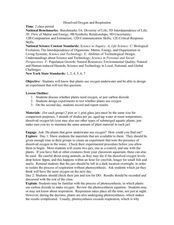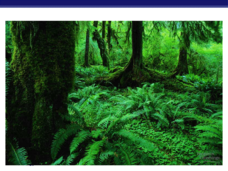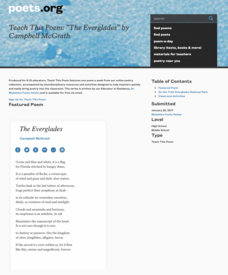Ocean Explorer
Architects of the Coral Reef
Coral Reefs are the focus of a life science lesson plan. Upper graders look at how coral reefs are formed, how the animals and plants reproduce, and the variety of ways that humans benefit from coral reefs around the world. Groups of...
Curated OER
Environment: Clouds of Changing Times
Here is a wonderful lesson which has youngsters interview family and local elders about the seasonal history of their local area. They focus on climate change by asking questions about rainfall, temperatures, length of the seasons, and...
Desert Discoveries
Built for the Desert
The saguaro cactus has an amazing ability to survive in a harsh environment. Learners identify the many adaptations for desert life that the saguaro employs. They look at each part of the saguaro and determine what role it plays in the...
Curated OER
Dissolved Oxygen and Respiration
Students are presented with the question, "Do plants that grow underwater use oxygen?" They create an experiment to test the presence of dissolved oxygen in the water using provided materials. Student experiments include a control jar as...
Curated OER
Photosynthesis: Life from Light and Air
All aspects of the photosynthesis process, and the way that plants have adapted with specializations are detailed here. The diagrams and info-graphics will be useful to your AP biology class. It could also be used as a review covering...
University of Kentucky
Beneficial Bug Scavenger Hunt
Many people think of bugs as annoying pests to be squashed, but most insects and spiders are beneficial, eating the actual pests or pollinating plants. After reviewing some of the common bugs in your area (they may differ from those...
Environmental Education in Wisconsin
Biome Travel Guide
In a perfect marriage of social studies and science, groups work together to research and create a travel guide presentation to share with the class. Not only do kids learn about the climate and geography of a biome, but also the...
Biology Junction
Cellular Structure
The human body contains more than 200 types of cells, and plants contain many other unique types of cells. While a huge variety of cells exist, they appear to have very similar structures. A detailed presentation describes the structure...
Biology Junction
Energy Flow Through an Ecosystem: Food Chains, Food Webs, and Energy Pyramids
When a minnow eats a piece of plastic, that garbage often tracks through multiple animals, causing harm to each as it passes through the food chain. Scholars learn about food chains, food webs, and energy pyramids with a presentation. It...
Virginia Department of Education
Mendelian Genetics
How did Mendel know which pea plants would demonstrate certain characteristics? Pupils explore the answer this question, among others, as they complete Punnet squares, research dominant and recessive traits, and explore hereditary...
PBS
Reading Adventure Pack: The Snowy Day
Scholars listen to a read-aloud of fiction and nonfiction books, The Snowy Day, written and illustrated by Ezra Jack Keats, and Snow Is Falling, written by Franklyn Branley and illustrated by Holly Keller, then take part in four creative...
Curated OER
Recyclers to the Rescue
Producers, consumers, food chains, and plants are the stars of this science lesson. Learners take part in an inquiry which helps them to discover the most effective and efficient way to grow a producer. They have a variety of containers...
ARKive
Parts of the Plant
Every good lesson on plant life should have a good worksheet to go along with it. Here is a very nice worksheet that requires students to label the four main parts of a plant. Included is a second worksheet that shows three different...
University of Colorado
Punnett Squares with Piebald Deer
Explore the science behind Earth's amazing diversity of life with this lesson plan on genetics. Looking at specific traits in piebald deer, carnations, and roan cattle, young scientists use Punnett squares to determine the possible...
Howard Hughes Medical Institute
Geological History of Oxygen
Earth didn't always have oxygen, so what caused the change that allows humans to live here? Learn about the change in O2 levels throughout geological history through an interactive graph. Each section offers greater detail on the changes...
Academy of American Poets
Teach This Poem: “The Everglades” by Campbell McGrath
Florida's Everglades come alive for young environmental scientists as they watch a video taken in the park and read a poem about the watery paradise. After a careful study of the two resources, class members consider the function of the...
PBS
All Tangled Up
It is a tangled web the ecosystem weaves. Learners begin an activity on ecosystem interactions by building a food chain and then a food web with yarn as a group. To finish, they research local environmental changes that may impact the...
PBS
Reading Adventure Pack: Oceans
Flotsam by David Wiesner and The Magic School Bus on the Ocean Floor by Joanna Cole, illustrated by Bruce Degen, begin a reading adventure pack focusing on oceans. With story listening and thoughtful discussion, scholars complete several...
Curated OER
Caterpillar Camouflage
Students list animals, plant parts, and reasons for caterpillars to camouflage themselves. For this animal and plant adaptations lesson plan, students also play a game where they use colors as camouflage.
Curated OER
Rain Forests
Students investigate the animals and plants of the rainforests. They define rainforest, watch and discuss a National Geographic video, and write a short story.
Curated OER
Life in the Rainforest
Third graders explore and study about a variety of life found within a rain forest. They choose three different animals to research from the tropical rain forest and identify one physical characteristic that helps each animal survive in...
Curated OER
This Is Tree-rific!
Third graders view a clip of the video Backyard Safari, "Trees," and portray the life cycle of a tree. They also view a clip on structures of a tree and draw a diagram of a tree in their science journals.
Curated OER
Animals Galore
Third graders use structural characteristics to sort and classify animals into groups.
Curated OER
Helping plants grow well
Students explore the effect of water, temperature and light on plant growth. Students are asked if they remember the LAW for plants. This is Light, Air(temperature) and Water, which all plants need for growth. Students are divided...
Other popular searches
- Arctic Plants and Animals
- Aquatic Plants and Animals
- Coastal Plants and Animals
- Artic Plants and Animals
- Plants and Animals Needs
- Animals and Plants
- Plants and Animals Interact
- Desert Plants and Animals
- Plants and Animals Die
- Attic Plants and Animals
- Comparing Plants and Animals
- Animals Plants and Water

























